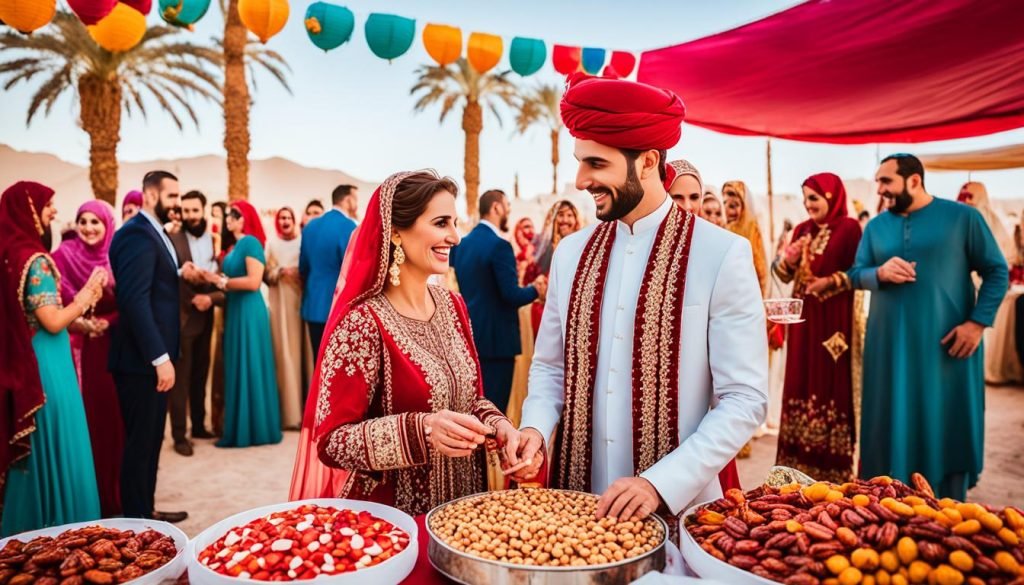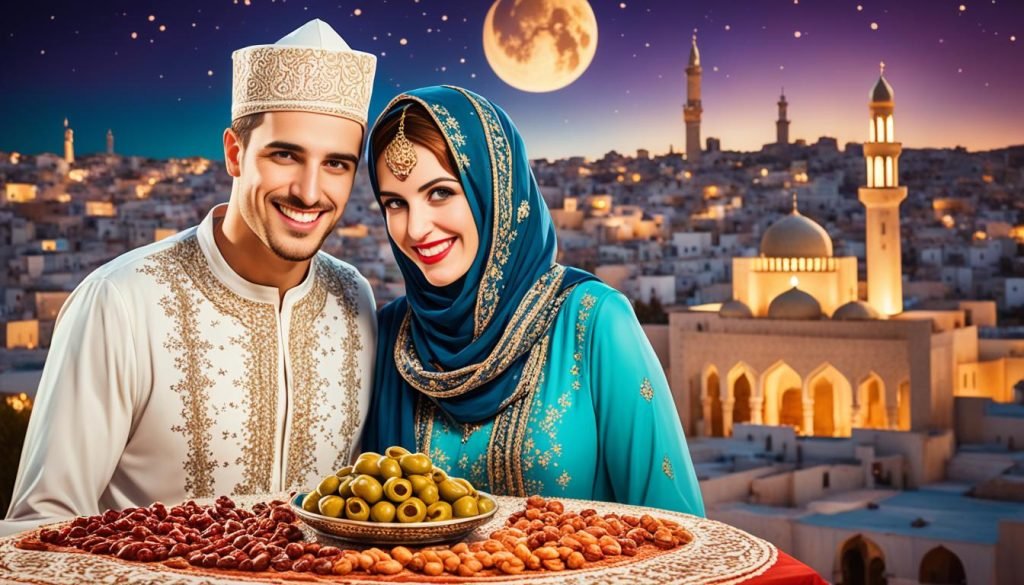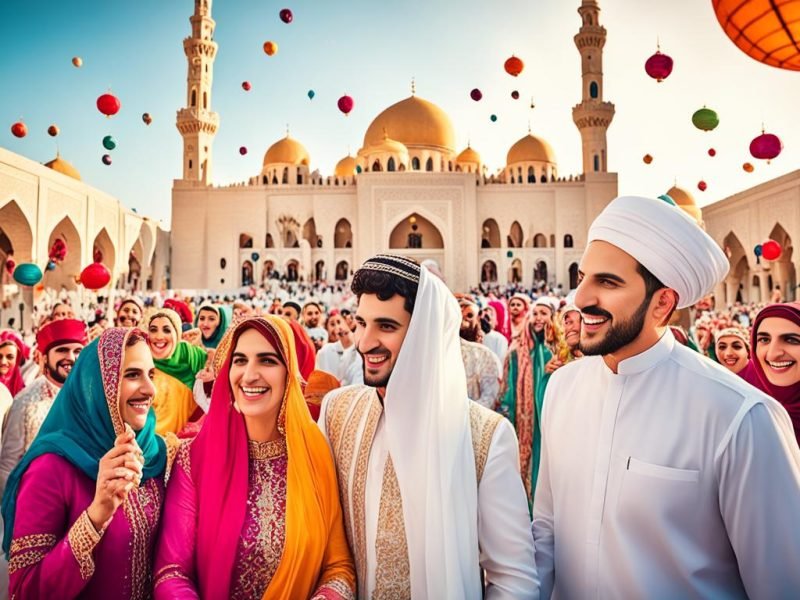I still recall my first visit to Tunisia. The bright Mediterranean sunshine was as welcoming as the people and their deep-rooted traditions. As a journalist, I’ve seen many cultural events. Yet, weddings during Ramadan in Tunisia stood out. They seemed unique given the fasting and spiritual reflection of Ramadan. This made me wonder about getting married there during this holy month.
Marriage is more than a bond between two people. It’s a festivity that goes beyond the couple to include family, tradition, and the era’s spirit. Thinking about a Ramadan wedding in Tunisia is special. The holy month changes the daily life pace in this beautiful country. Social customs stand out, making it important for those planning a wedding to understand these norms during Ramadan.
Key Takeaways
- While Tunisian traditions allow for marriages during Ramadan, societal norms are an important consideration for prospective couples.
- Understanding the importance of Ramadan in Tunisia is crucial when planning a wedding during this holy month.
- Getting married in Tunisia during Ramadan requires adherence to cultural sensitivities and religious observances.
- Legal procedures in Tunisia, including recent changes, may impact the ease of conducting weddings during Ramadan.
- Respecting local traditions and consulting with local notaries can help navigate any potential obstacles.
Understanding Ramadan in Tunisia
The holy month of Ramadan holds deep significance in Tunisia. It weaves into the nation’s cultural and religious fabric. This time unites Tunisians, linking faith and heritage. The cycle of fasting and feasting sets the daily rhythm, affecting even Tunisia marriage customs during Ramadan.
Significance of Ramadan in Tunisian Culture
Ramadan’s spiritual importance is vast in Tunisia, enhancing the community spirit and togetherness. Everywhere, from city markets to quiet date palm groves, feels its impact. It’s a period for self-reflection and religious observance. Traditions like Tarak prayers and communal Iftars are central, shaping social interactions and matrimonial celebrations.
Adhering to Religious Observances During Holy Months
Religious observances dictate life’s rhythm during Ramadan in Tunisia. These customs influence wedding ceremonies, which are vibrant and joyful. Weddings post-sunset respect fasting hours, and feasts are modest. These practices show Ramadan’s deep connection with daily life, including weddings.
| Aspect of Wedding | Non-Ramadan Period | During Ramadan |
|---|---|---|
| Timing of Ceremony | Varies, can be day/night | Post-sunset to respect fasting |
| Food and Feasting | Lavish & varied | Modest, in line with Iftar traditions |
| Entertainment | Music, dance, extensive | Moderate, reflective of the holy month |
| Dress Code | Elaborate | Conservative & modest |
| Overall Atmosphere | Festive & elaborate | Community-focused, spiritual |
Exploring Tunisian culture during Ramadan reminds me of the power of tradition. It strengthens bonds and unity. For those marrying in this period, respecting these customs is considerate and enriches the experience.
The Impacts of Local Laws on Tunisian Ramadan Weddings
The influence of Tunisian Ramadan marriage laws during the holy month is profound. These laws weave together sacred traditions and legal rules, creating a detailed picture for couples marrying in Ramadan. They align closely with Tunisia’s Islamic values, ensuring marriages are both sacred and legitimate.
Tunisia’s Islamic Legal Framework and Marriages
In Tunisia, marriage is seen as both a legal agreement and a religious covenant. This dual aspect highlights the importance of wedding rituals and the laws that oversee them. It’s not just about following the rules—it’s about appreciating the deep meaning of these unions during Ramadan.
Recent Changes in Tunisian Marriage Laws
There have been significant updates to Tunisian marriage laws, particularly with the removal of the 1973 rule. This has allowed Muslim women to marry non-Muslim men, marking progress in personal freedom and human rights. However, there are still challenges for those getting married in Ramadan.
Finding a notary who can accommodate and dealing with social views are some difficulties faced. Despite these legal changes, adjusting to new realities takes time. The community’s practice of these laws is as important as their wording.
Understanding and adapting to these legal and cultural shifts is crucial. We must balance respecting traditions with embracing new changes.
Respecting Tunisian Traditions and Customs
In my travels, I’ve discovered an interesting mix at Tunisia wedding traditions during Ramadan. They combine deep respect with celebration. The holy month adds special reverence and community spirit to weddings. To respect Tunisian customs, it’s key for couples to consider fasting and prayer timings. This ensures their celebration fits into guests’ spiritual routines.
In the cities, weddings are full of life, but it’s different in rural areas. There, celebrations are quieter to honour Ramadan. Music and dance are lessened. The wedding dinner, served after sunset for Iftar, includes traditional dishes given a festive touch.

Dress code is another area where respect matters greatly during this time. Couples and guests are advised to dress modestly, especially where tradition is strong. Even in coastal resorts, where things might be more laid-back, modesty in dress acknowledges Tunisia wedding traditions during Ramadan.
Those wanting a Tunisian wedding in Ramadan need to be thoughtful. They must be ready to blend local customs with their celebration. Working with a local wedding planner can help align the event with cultural norms. This approach ensures the wedding respects local traditions.
Ultimately, the beauty of a Tunisian wedding during Ramadan lies in the melding of personal joy with communal spirituality, creating a unique tapestry that honours both the occasion and the time of year.
Tunisian Marriage Customs During Ramadan
Exploring Tunisian marriage customs during Ramadan reveals a fascinating mix of old traditions and deep religious respect. This time is marked by serious devotion, setting a special stage for Tunisia wedding traditions during Ramadan. Weddings are carefully planned around the spiritual pace of Ramadan. They often start after sunset and the breaking of the fast. This timing pays homage to both the holy month and wedding customs.
Understanding the sacred tie between Ramadan’s spirituality and Tunisian matrimonial customs is key to appreciating the delicate timing and nature of wedding ceremonies this month.
Celebrations are smartly slated for after Iftar. This allows everyone to join in without affecting their fast. This thoughtful timing shows the lovely blend of cultural and religious practices.
- Weddings synchronised with Iftar time
- Evening celebrations to respect daylight fasting
- Culinary considerations – halal and Ramadan-inspired menus
- Infusion of traditional Tunisian music and Ramadan spiritual hymns
Adding a modern touch to tradition, the Tunisian way balances the old with the new beautifully during Ramadan. This insight into wedding traditions during Ramadan showcases the country’s capacity to fuse contemporary life with time-honoured customs.
Practical Considerations for Getting Hitched in Tunisia During Ramadan
Thinking of getting hitched in Tunisia during Ramadan mixes romance with cultural depth. It’s important for those planning to marry to grasp the key details. This ensures the month’s respect and the wedding’s joy stay intact.
Navigating the Legal Procedures
Dealing with Tunisia’s legal system in Ramadan needs care and early planning. Official hours change, making the process trickier. Couples must talk to local authorities early to meet all legal needs. This includes getting marriage licenses and completing formalities according to Ramadan’s rules.
Challenges with Notary Services in Tunisia
Finding a notary during Ramadan can be tough. Some notaries may not work due to their observance of Ramadan. This means you have to book early. Look for a professional willing to help during Ramadan.
Knowing these practical considerations for Ramadan weddings is key. I suggest talking to those who’ve done it and hiring local wedding planners. They have the knowledge and connections you need. With patience and the right plan, your dream Tunisian Ramadan wedding can happen.
Can You Get Married During Ramadan In Tunisia?
In Tunisia, the laws are more inclusive. So, you might ask, Can You Get Married During Ramadan In Tunisia? The law doesn’t say no, but Ramadan brings unique challenges. Let’s talk about the Ramadan marriage regulations in Tunisia. Understanding these can help you during your wedding planning.

Ramadan is a time of deep spiritual meaning. It changes daily life and social habits. Marrying during Ramadan? You’ll see how Tunisian law and religious traditions mix. Finding a notary to do the marriage can be hard. Many officials stick to old traditions and may not work during this time.
Planning a wedding now? Know both the laws and the customs. Here’s my advice:
- Check the law: Make sure your paperwork fits the Ramadan marriage regulations in Tunisia.
- Talk to officials: See if a wedding during Ramadan is possible.
- Think ahead: Plan your wedding when fasting is over to respect customs.
As your guide, I aim to help with your question, Can You Get Married During Ramadan In Tunisia?. I offer solid advice to prevent problems. Together, we’ll understand these cultural aspects, making your journey easier.
Interfaith Marriages in Tunisia During Ramadan
After legal changes in Tunisia, interfaith marriages during Ramadan have seen big changes. These shifts show a society that’s evolving. It struggles to mix new laws with old cultural ways.
New Legal Directions Post-2017
Since 2017, Tunisia made a big change to its marriage laws. Now, non-Muslim partners don’t have to convert for marriage. This move is a big step towards inclusion and freedom of religion. It lets different couples legally unite and challenges old views, pointing towards wider acceptance of interfaith marriages.
Societal Attitudes Towards Interfaith Unions
Even with new laws, people’s views on interfaith marriages during Ramadan are mixed. Some hesitate due to personal beliefs. While laws allow these marriages, social acceptance is complex. Sometimes, notaries might refuse to marry interfaith couples based on their beliefs. This makes marrying during Ramadan challenging, requiring a balance between social norms and personal beliefs.
As a journalist, I’m drawn to this story of laws changing and societal attitudes slowly shifting in Tunisia. It’s a story of progress, where love meets tradition during Ramadan.
Tunisia Wedding Traditions During Ramadan
Embracing Tunisia wedding traditions during Ramadan is truly special. It allows couples to celebrate their love during a very holy time. The beauty of traditional Tunisian Ramadan weddings lies in their rich customs. These customs blend deeply with the religious practices of Ramadan.
Wedding customs change their tune during Ramadan. The days are for fasting, and the nights for joyful celebrations. When planning a wedding in this time, it’s crucial to start the festivities after iftar. This respects the fasting and brings everyone together in celebration.
Not only do these traditions represent cultural heritage, but they also symbolize the unity and communal spirit so integral to Ramadan.
Let’s explore the specifics that define these weddings:
- The attire, often modest yet ornate, resonates with traditional values while exuding elegance.
- The cuisine, albeit delayed until evening, is a lavish spread that delights guests after a day of fasting.
- Wedding rituals, influenced by regional nuances, contribute to an ambiance imbued with devotion and celebration.
My focus here is to outline how each aspect of the wedding becomes a reflection of the Ramadan spirit:
| Wedding Element | Tradition During Ramadan | Cultural Significance |
|---|---|---|
| Attire | Modest garments blended with festive accents | Merging respect for religious observance with ceremonial joy |
| Food | Sumptuous nocturnal feasts, often featuring dates and traditional sweets | End of day’s fast transitioning into matrimonial feast |
| Timing | Celebrations aligned with post-iftar hours | Harmonizing wedding festivities with the fast-breaking schedule |
In conclusion, Tunisia’s wedding traditions during Ramadan beautifully blend faith and festivity. By including these traditions, couples create a memorable wedding. It honors and enjoys Tunisia’s rich cultural heritage.
Conclusion
Getting married in Tunisia during Ramadan is a deep mix of age-old tradition, rules, and cultural details. It’s vital for couples to understand and respect these aspects, especially as laws change. Careful planning and a good grasp of local customs are key.
While new laws have made getting married easier, traditional beliefs are still strong. It’s important to consider when to have the ceremony and how it affects others during this holy month. Seeking help from local experts is a wise move.
Marrying during Ramadan is about combining love with faith. Knowing the legal bits and how to fit into the community is essential. By valuing Tunisian traditions and Ramadan, couples can make their big day special and respectful.







